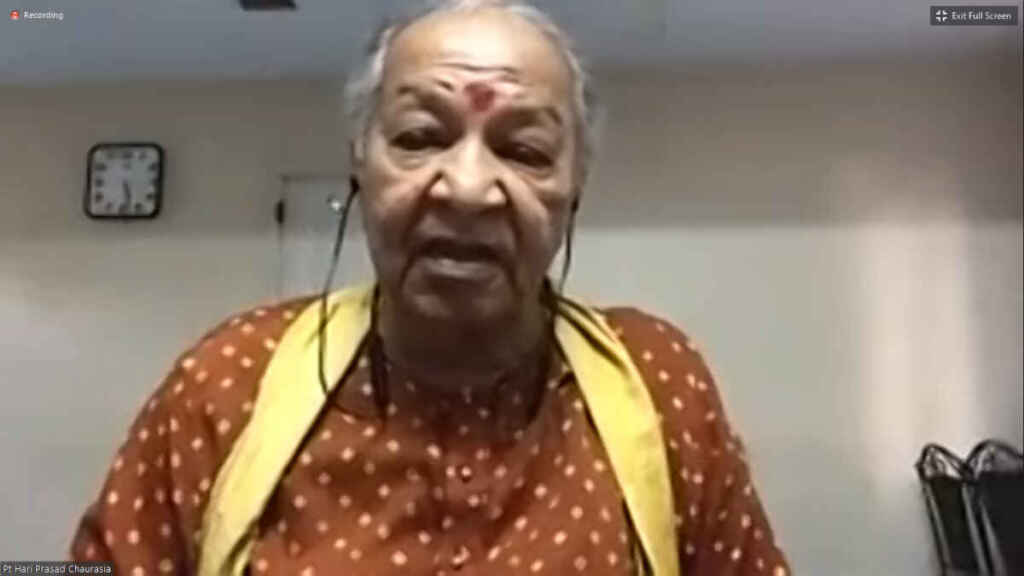Latest Virtual Session Of ‘Sur Aur Saaz’ with Pt Hariprasad Chaurasia And Kaushiki Chakraborty
Priya Debnath, abptakmaa, Kolkata, 5th Oct 2020 : Prabha Khaitan Foundation in association with EZCC and Swar has recently organized a virtual session of ‘Sur aur Saaz’ with renowned Hinduatani Classical flautist and music director, Pandit Hariprasad Chaurasia. One of the finest classical singers of India and the daughter of the classical stalwart Pt. Ajoy Chakraborty, Kaushiki Chakraborty conversed with the maestro. The session was introduced by Ms. Vandana Singh of Swar.
The session began with Panditji praising Ms. Chakraborty for her inexplicable talent in Indian Classical singing; she humbly notified that this conversation is not a ‘jugalbandi’ but a ‘talim’ for her and the numerous avid listeners who joined in for the session. Pandit ji spoke about his childhood while he grew in Allahabad and people from Banaras used to visit their place, whose children used to sing. His mother died when he was only six years old. His father was quite strict and wanted him to become a body builder as he recalled as ‘pahelwan’. He was trained at the ‘akhra’ but he never enjoyed the sport for all the painful experiences, however he continued visiting that place to obey and make his ‘pahelwan’ father happy. He even took music lessons without his father’s knowledge. Panditji considers himself as very lucky to be able to dedicate his life to the art form which he has always loved. He was asked about his journey from ‘pahelwani’ to the world of music, to which Panditji said; he started playing the flute by making sure neither his voice nor the sound of the flute reaches his father’s ears. He had a friend who was a ‘tabla’ player who asked him to come over to his place and practice music, they used to practice music whenever they felt like and there was no particular time binding. His friend’s parents loved Classical music and he was very happy to be with them and was well fed. This continued for many years without Panditji’s father getting to know about his inclination towards music. His father wanted him to get into a job immediately after he finishes his ‘matriculation’, which was quite difficult without any technical skill training, so he took training in short-hand typing and managed getting a job at the ‘Milind Company’ in Allahabad.

After Panditji got the job, his father’s happiness knew no bounds. Panditji then added that he used to sing for the radio during that time and met his future Guruji, Bholanath Ji, who started training him soon after he met then young Hariprasad. He started playing the flute on various platforms which gave way to his illustrious career as a flautist. He said that everyone who heard him playing the flute loved his performance. He then talked about an offer which was in Bhubaneswar, where he worked for the radio and self-taught himself in Indian Classical Music. Pandit ji with his talent started teaching and playing the flute in different engagements, which helped him earn a good living.

A great concern was raised by Ms. Chakraborty that there are people with immense talent who don’t pursue their career in the field they love, just because of the effort they have to put in and the difficulties they have to face, again there are people who are always supported by their parents and encouraged to pursue the field they have interest in and love for, to which Panditji said that environment is a very important aspect for nurturing one’s talent and the children of artists are good when they have the talent and take interest in pursuing it. Pandit ji added that he loved listening to music so he used to go to the engineer’s room after recording at the studio and demanded different cassettes to be played. During this time, he came across eminent musicians like Madan Mohanji, Naushad Sir, O. P. Nayyar and many others.
His ubiquitous habit of riyaaz was also shed light upon. Even on aeroplanes and other places, he usually sits quietly for some time and starts playing his flute, at times very slowly which does not emit much sound, but he keeps on practicing, Ms. Chakraborty requested Panditji to talk about the love and dedication related to ‘riyaaz’. To which he said that in order to gain something one has to lose a lot of things with God’s grace when one gets what he/she seeks for should protect, celebrate and nurture it by all means. Ms. Chakraborty requested Panditji to explain the importance of ‘riyaaz’ to the younger generation. Panditiji said that instilling the importance of riyaaz in a child’s mind depends on the parents totally, they can make them listen to recordings, arrange for cultural functions the parents should put effort to develop the sense of importance of an art form in their children. He added that the children of new generation are versatile and manage studies and other activities with precision.
Ms. Chakraborty talked about the Gurukuls in Mumbai and Bhubaneswar, which are very beautiful and has a serene atmosphere with nature’s music, she asked Panditji whether he always wanted to set up such institutions, he said that he did not plan it since the beginning, he said the eminent personalities accepting the ways and patterns of the Gurukul was an inspiration for him, he liked the fact that one has to do all their daily chores and stay focused on their goal. He said that the world will love you if only you are focused on your motive and are true to your art. The session ended here with much gratification.
It was evident that the present session of Sur aur Saaz was an enchanting experience of reminiscence of the illustrious life of the famous Pandit Hariprasad Chaurasia.




